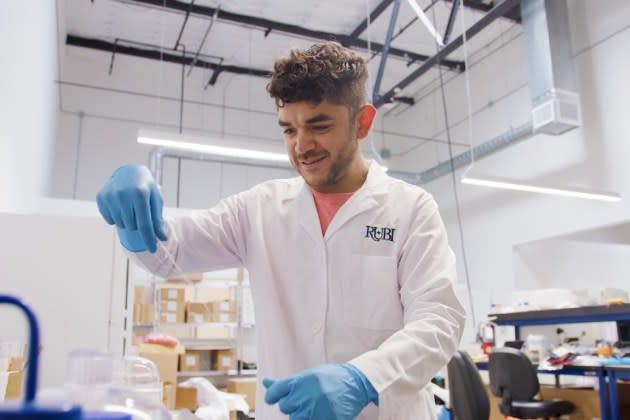Walmart Pilots Program to Create Apparel from Lab-Grown Cellulose

Walmart is joining forces with a material science innovator that generates fibers out of thin air.
The big box retailer last week announced a strategic partnership with Rubi Laboratories, a San Francisco startup that has pioneered a process for capturing carbon emissions and converting them into cellulose. Inspired by how trees pull CO2 from the atmosphere, founders Neeka and Leila Mashouf developed a way to mimic this organic process in a lab environment.
More from Sourcing Journal
Yellow Avoids Teamsters Strike but Bankruptcy Isn't off the Table
LA's Laguna Fabrics Launches the Natural Selection Collection with Lenzing, Hyosung
The cellulose generated through Rubi’s operations can be used to create textiles like lyocell, rayon and viscose. The final products are carbon negative and resource neutral, as they don’t rely on deforestation, the founders said. Each year, more than 100 million trees are cut down globally to make fabric.
“Innovation is such an important part of building resiliency in our supplier base and maintaining surety of supply,” Walmart executive vice president of sourcing Andrea Albright said in a statement. Walmart is the first company to execute both manufacturing and brand pilot agreements with Rubi.
First, they plan to develop a prototype garment together and produce samples for testing. “If successful, a larger apparel collection could follow and be available in our stores,” Albright added. The manufacturing pilot will explore how the technology could figure into Walmart’s supply chain at a larger scale, testing the efficacy of capturing carbon emissions from some of the retailer’s own operations.
“Rubi’s technology could reimagine the apparel supply chain,” Albright said. There are potential applications for the science beyond the fashion sector, she added, pointing to packaging, building materials, food and new raw materials as areas to explore. “The possibilities are staggering.”
Rubi has some heavy-hitters in its corner, such as Patagonia and H&M Group, which contributed to the $8.7 million seed round it raised this year. Rubi won the H&M Foundation’s Global Change Award in 2022, which came with a $250,000 grant from the National Science Foundation. It has also engaged in strategic partnerships with Reformation, Ganni and Nuuly.
Neeka Mashouf, Rubi’s CEO, said the startup’s goal “is to ensure a thriving future by restoring Earth’s ecological balance with reimagined supply chains.” Walmart’s “ability to mobilize positive impact across its supply chain of diverse U.S. partners could be massively impactful in scaling our production and delivering on our commitments,” she added.
“Walmart’s sustainability efforts are grounded in our belief that we can use our scale to have a positive impact everywhere we operate, meaning doing more good, not just less harm,” Albright said. Mainstream adoption of Rubi’s lab-generated cellulose will help drive down costs for companies across the industry. “Importantly, sustainable should also mean affordable, so we are also focused on prototyping an apparel line that can be produced at scale and widely available to our customers,” she added. “We’re confident that, if successful in these pilots, there is a real possibility of creating garments that offer value and contribute to a better environment for everyone.”

